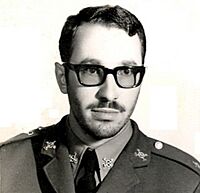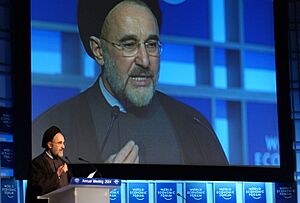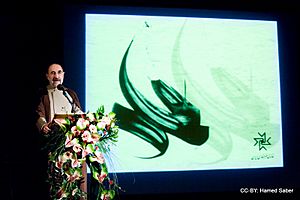Mohammad Khatami facts for kids
Quick facts for kids
Mohammad Khatami
|
|
|---|---|
|
محمد خاتمی
|
|
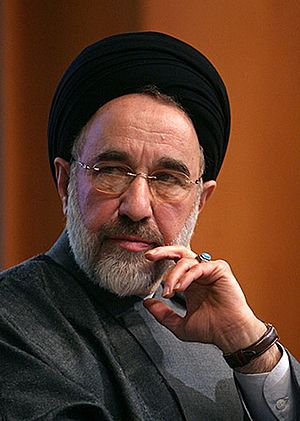
Khatami in 2007
|
|
| 5th President of Iran | |
| In office 3 August 1997 – 3 August 2005 |
|
| Supreme Leader | Ali Khamenei |
| Vice President | Hassan Habibi Mohammad Reza Aref |
| Preceded by | Akbar Rafsanjani |
| Succeeded by | Mahmoud Ahmadinejad |
| Minister of Culture and Islamic Guidance | |
| In office 9 November 1982 – 24 May 1992 |
|
| President | Ali Khamenei Akbar Rafsanjani |
| Prime Minister | Mir-Hossein Mousavi |
| Preceded by | Mir-Hossein Mousavi (acting) |
| Succeeded by | Ali Larijani |
| Member of the Parliament of Iran | |
| In office 28 May 1980 – 24 August 1982 |
|
| Preceded by | Manouchehr Yazdi |
| Succeeded by | Mohammad Hosseininejad |
| Constituency | Yazd, Ardakan district |
| Majority | 40,112 (82.1%) |
| Personal details | |
| Born | 14 October 1943 Ardakan, Yazd, Imperial State of Iran |
| Political party | Association of Combatant Clerics |
| Spouse |
Zohreh Sadeghi
(m. 1974) |
| Children | 3 |
| Parent |
|
| Relatives | Mohammad-Reza Khatami (brother) Ali Khatami (brother) Mohammad Reza Tabesh (nephew) |
| Alma mater | University of Isfahan University of Tehran |
| Signature |  |
| Website | Official website: http://www.Khatami.ir/ |
| Military service | |
| Branch/service | Iranian Imperial Army |
| Years of service | 1969–1971 |
| Rank | Second lieutenant; financial specialist |
| Unit | Tehran region 3 sustainment |
Mohammad Khatami (born 14 October 1943) is an Iranian politician and religious scholar. He served as the fifth president of Iran from 1997 to 2005. Before becoming president, he was Iran's Minister of Culture from 1982 to 1992.
Khatami became famous around the world when he won the 1997 presidential election with almost 70% of the vote. He promised to bring more freedom and positive changes to Iran. One of his most famous ideas was the "Dialogue Among Civilizations". This was a call for different cultures to talk and understand each other, instead of fighting. The United Nations liked this idea so much that it named 2001 the "Year of Dialogue Among Civilizations."
As president, Khatami supported freedom of expression, a more open society, and friendly talks with other countries. He also worked on improving Iran's economy by welcoming foreign investment. After his presidency, he became a critic of President Mahmoud Ahmadinejad's government.
Contents
Early Life and Education
Mohammad Khatami was born on 14 October 1943, in the town of Ardakan, Iran. His family are sayyids, which means they are believed to be descendants of the Prophet Muhammad. His father, Ayatollah Ruhollah Khatami, was a respected religious leader.
In 1974, Khatami married Zohreh Sadeghi. They have two daughters and one son. His brother, Mohammad-Reza Khatami, also became a politician.
Khatami studied Western philosophy at Isfahan University. He then went to the city of Qom to study Islamic sciences. He reached the highest level of study, called Ijtihad. Before becoming president, he held several important jobs. He was a member of parliament, the Minister of Culture, and the head of the National Library of Iran. Besides his native language, Persian, Khatami can speak Arabic, English, and German.
Presidency (1997–2005)
Khatami's election on 23 May 1997 was a surprise to many. About 80% of voters turned out, and he won with 70% of the vote. His supporters included young people, women, and others who wanted change in Iran. The day of his election is often seen as the start of a "reform" period in the country.
As president, Khatami wanted to create a society with more democracy and a strong rule of law. However, he faced many challenges. In Iran's political system, the Supreme Leader has more power than the president. Khatami's plans for change often clashed with more conservative leaders who controlled key parts of the government, like the army and the Guardian Council. The Guardian Council is a powerful group that can block new laws.
Khatami tried to pass laws to give the president more power to protect people's rights and make elections fairer. These laws, called the "twin bills," were passed by the parliament but were blocked by the Guardian Council.
Economic Policy
Khatami's government worked to improve Iran's economy. His policies continued the work of the previous government to build up Iran's industries. He supported a free market and encouraged private businesses.
His government created a five-year plan to create 750,000 new jobs each year and help the economy grow. While the plan did not meet all its goals, the economy did improve. The World Bank began lending money to Iran again for projects like health and sanitation. For the first time since 1979, private banks were allowed to open.
Foreign Policy

During Khatami's presidency, Iran's relationship with the rest of the world improved. Instead of conflict, he promoted his idea of a "Dialogue Among Civilizations". He was the first Iranian president to visit many European countries, including Italy, France, and Germany.
He met with many world leaders, such as Pope John Paul II, Vladimir Putin, and Jacques Chirac. He worked to build better relationships with countries in the Persian Gulf and the European Union.
In 1998, a crisis happened when the Taliban in Afghanistan killed 11 Iranian diplomats. Many in Iran wanted to go to war, but Khatami chose to use diplomacy. He worked with the United Nations, and the situation was resolved peacefully.
Cultural Changes
Khatami's presidency brought more freedom to Iran's culture. Newspapers and magazines were able to criticize the government more openly. The Association of Iranian Journalists was formed to protect journalists.
The arts also saw more freedom. Filmmakers like Abbas Kiarostami made movies about social issues. Books that were once banned were allowed to be published. In 1998, Iran's National Orchestra was founded, helping to support music in the country.
Post-Presidential Career
After leaving office in 2005, Khatami continued to be active. He founded two organizations:
- International Institute for Dialogue among Cultures & Civilizations: An organization that promotes his idea of dialogue between different cultures.
- Baran Foundation: An organization focused on freedom and development within Iran.
In 2005, he was appointed by the United Nations to be a member of the Alliance of Civilizations, a group that works to improve understanding between different societies.
Khatami considered running for president again in 2009 but decided to support his friend, Mir-Hossein Mousavi, instead. He supported the protests that followed the election. Because of his support for the reform movement, the Iranian media is not allowed to publish his picture or quote his words.
In the 2013 election, Khatami and other reformists supported Hassan Rouhani, who went on to win the presidency.
Political and Cultural Ideas
Dialogue Among Civilizations
Khatami's most famous idea is the "Dialogue Among Civilizations." He presented this idea as an alternative to the theory of a "Clash of Civilizations," which suggested that different cultures would always be in conflict. Khatami argued that through talking and understanding, different cultures could live together peacefully. He believed that culture and morality should be more important than politics.
Khatami as a Scholar
Khatami is also a respected scholar, especially in the field of political philosophy. He has written several books about politics, religion, and society. In his writings, he argues for a government that is based on the will of the people and can be criticized by them. He believes that power should not be seen as sacred, but as a responsibility given by the people.
Electoral history
| Year | Election | Votes | % | Rank | Notes |
|---|---|---|---|---|---|
| 1980 | Parliament | 32,942 | 82.1 | 1st | Won |
| N/A | Disqualified | ||||
| 1997 | President | 20,078,187 | 69.6 | 1st | Won |
| 2001 | Won |
Awards and Honors
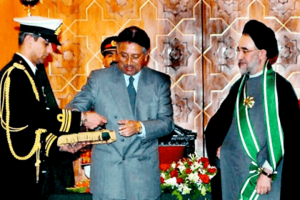
Khatami has received many awards from around the world for his work, including:
- Gold medal from the University of Athens
- Honorary doctorates from universities in Moscow, Tokyo, and Delhi
- Pakistan's highest civilian honor, the Nishan-e-Pakistan
- An honorary doctorate of Law from the University of St Andrews in Scotland
- Venezuela's Order of the Liberator
Images for kids
-
Khatami as culture minister in 1985, with prime minister Mir-Hossein Mousavi
-
Khatami at the World Economic Forum in 2007
-
Khatami holding the Quran in his hands
See also
 In Spanish: Mohammad Jatamí para niños
In Spanish: Mohammad Jatamí para niños
- 2nd of Khordad Movement
- 1997 Iranian presidential election
- 2001 Iranian presidential election
- 2009 Iranian presidential election
- 2013 Iranian presidential election
- Liberal movements within Islam
- Modern Islamic philosophy


